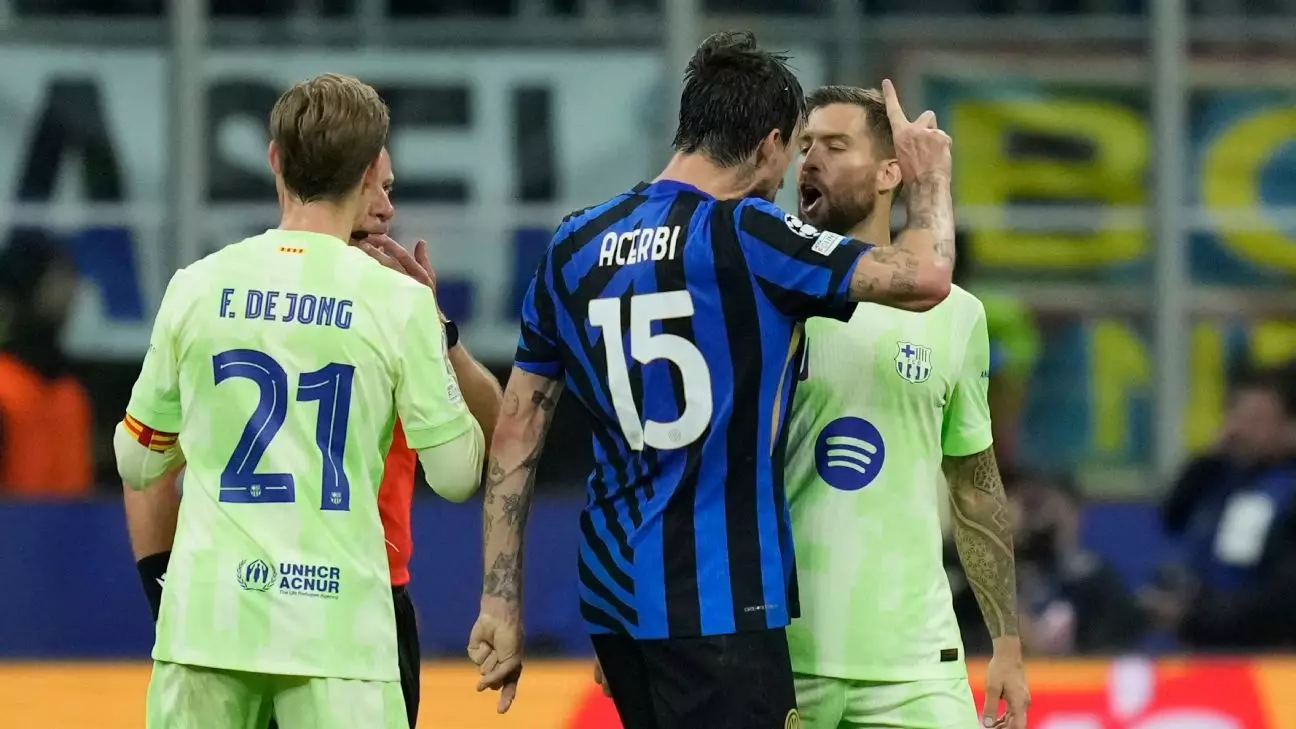The recent UEFA Champions League semifinal between Barcelona and Inter Milan was nothing short of a rollercoaster ride, with emotions running high and a palpable tension that seemed to electrify the stadium. While Inter Milan triumphed 4-3 after an exhilarating extra time, the match will likely be remembered for more than just the scoreline. The heated exchange between Barcelona defender Iñigo Martínez and Inter’s Francesco Acerbi encapsulates the fierce rivalry and the pressures of high-stakes football, illuminating how even the smallest incidents can spark controversy in such intense circumstances.
A Moment of Discord
The flashpoint of the match occurred shortly after Hakan Çalhanoğlu’s successful penalty kick, which ignited a wave of celebration from Inter. As Acerbi ran past Martínez, seemingly reveling in the moment, a verbal confrontation ensued. Martínez, feeling provoked by what he interpreted as taunting, later insisted that his reaction—allegations of spitting—was exaggerated and unintentional. “My reaction to that was unnecessary but at no moment have I aimed for him,” he stated, attempting to downplay the incident. The insistence on his innocence raises questions about accountability in the heat of competition, notably whether players are held to the same standards as spectators expect from them.
The Referee’s Dilemma
The decision-making by the refereeing crew in this match has come under significant scrutiny. With Acerbi immediately reporting the incident to the referee, the lack of disciplinary action could appear to undermine the seriousness of player conduct on the pitch. The absence of intervention from the Video Assistant Referee (VAR) further complicates the situation, as many observers feel it could have provided clarity during a moment that clearly was not isolated from the aggressive nature of the game. This brings to light the question of how effectively VAR can operate within such emotionally charged scenes and whether it can consistently aid officiating in maintaining discipline and fair play.
Barcelona’s Response and Broader Implications
In the aftermath, Barcelona voiced their discontent with the officiating, claiming that crucial decisions seemed to tilt in Inter’s favor. Midfielder Pedri’s appeal for an investigation into referee performance signifies how deeply frustrations run in these elite competitions. The pressure not only shapes a club’s performance but also exposes the fragility of player behavior under scrutiny. While accusations around unfair refereeing abound in high-stakes football, they should likewise lead to discussions about sportsmanship and conduct, turning the lens on how players uphold their professional standards.
A Spirited Showdown that Spurs Rivalry
As the dust settles on this breathtaking semifinal clash, Inter will look ahead to their final against either Paris Saint-Germain or Arsenal, a match that will itself carry the weight of expectation and rivalry. On the other hand, Barcelona’s early exit raises profound questions about their current trajectory and ability to endure such fierce contests. While football is often termed a beautiful game, this match served a reminder that beauty can sometimes be marred by strife, showcasing the duality of sportsmanship and emotional investment that lies at its core. The narrative crafted within this game—a blend of triumph, controversy, and rivalry—will echo well beyond the confines of the pitch, influencing how fans, players, and officials perceive the beautiful game.

